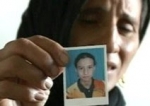13 September 2007
When underage Coptic girls disappear : The unspeakable agony


 Last February officials for the first time placed a figure on the number of disappearing Coptic women. The report of the National Council for Human Rights declared it had received 32 complaints of missing young Coptic women during the
Last February officials for the first time placed a figure on the number of disappearing Coptic women. The report of the National Council for Human Rights declared it had received 32 complaints of missing young Coptic women during the
nine-month period from March to December 2006. And these were only the cases brought to the attention of the council; the actual figures are horrifying.
Missing!
On the ground, the reality is grim. Last week Watani received complaints from three fathers whose underage daughters disappeared the week before. The agony is unspeakable. A typical scenario begins with the daughter going out for some perfectly normal errand and not coming back. The family thinks something may have held her up but, when the hours go by and still no daughter back home, anxiety sets in then real alarm as the family realises no normal hold-up can keep her away that long. They rush to the police to report her missing, but are told to return later since no-one may be considered officially missing except after 24 hours of disappearance.
As though the heart-rending terror of realising their daughter may be suffering while they the parents can do nothing for her, as though this were not enough, the experience of filing the report at the police station is agony in its own right. The officers jeer at the parents, taunting and insulting them with direct allegations that the daughter had possibly eloped—a dead shame in Egypt—and probably converted to Islam. Very frequently the police procrastinate, letting the parents wait in humiliation as the officers or staff attend to some other matter or simply have tea.
Of age
When the daughter is finally reported missing, the parents discover that the police and security officials are viciously uncooperative, merely claiming they “can’t find the girl”. The parents have either to resign to their fate—an all but impossible task considering the recurring nightmare of their beloved daughter being abused, misled, or pressured by strangers without mercy—or to take the law into their own hands. A case in point is the recent disappearance of 17-year-old Injy Atef of Assiut whose father shuttled from Assiut in Upper Egypt to Cairo to Mansoura in the North Delta on rumours that his daughter may have been spotted there. All the while the police was uncooperative and, even worse, downright hostile. To date, Injy has not been found, neither have the large majority of girls who disappeared.
All the parents, the Coptic community, and rights activists ask for is that the girls be found and returned home. Once they are of age they can—and are entitled to—take such major decisions as converting to a different religion or marrying whoever they choose.
In court
It is not as though Egyptian law condones such behaviour. Lawyer and head of the Egyptian Union for Human Rights, Naguib Gabraïl, is filing an official complaint against the Justice Minister, Interior Minister, and Grand Sheikh of al-Azhar, calling upon them to implement the law so that underage girls are returned home. Gabraïl is backed by an official memo sent from the deputy of the Interior Minister to the head of the security apparatus in Qalyubiya asking him to hand over underage missing girls to their parents; they should not be allowed to convert or marry. Conversion in case of underage girls, Gabraïl said, involves forging official documents since the girls are minors and are not to sign legal papers, and marriage is in such cases tantamount to rape. Gabraïl’s case will be seen in court next October.
POSTED BY /http://www.wataninet.com
17:10 Posted in Egypt | Permalink | Comments (0) | ![]() Facebook |
Facebook |



















The comments are closed.